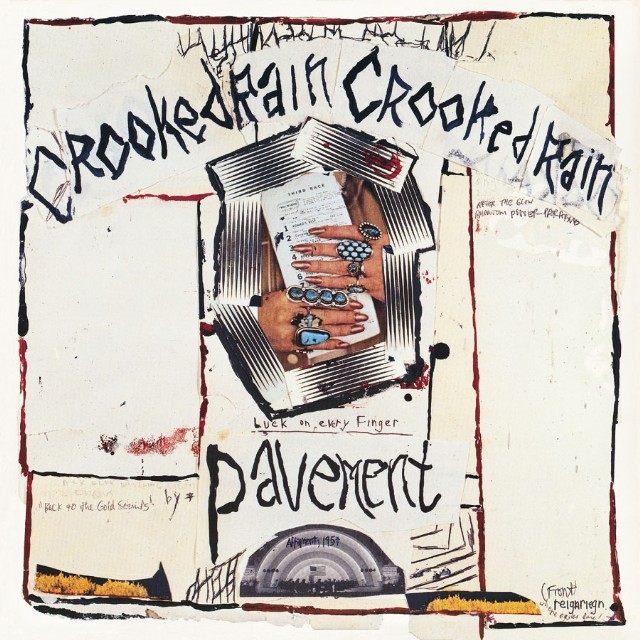
On This Day: Crooked Rain, Crooked Rain
by Patrick Grealey | February 14, 2017
I’ve always been slightly obsessed by ‘the canon’ of rock music, and, despite its dubious authority, I’ve ultimately been thankful for it, too. It’s a good place to start and not a bad place to finish, and while it may delimit, it also guides; while it may baffle the few, it makes great sense to the many. This canon, though, is an imposing thing, an edifice against which a listener must, for better or worse, define themselves. As we work our way through it, how we interact with this canon becomes a crucial test of our compatibility with the culture it represents, as well as with everyone who ever leant a hand in constructing it. The stakes of this test are raised yet higher when dealing with a canonical artist of a more sub-cultural provenance; their canonical status cannot be explained by mass popular assent, and canons are about consensus, after all. Must there be something the masses are missing? What if I miss it too?
Consider the pantheon’s inclusion of a poxy, yelping, semi-popular Californian indie band called Pavement. How did they get there? Well, such artists are snuck in through the back door, for in the end few do as much to define the rock canon as music critics, and even fewer love Pavement quite like music critics do. Counter-culturally definitive of the final unruly years of an unruly millennium—years marked more overtly by the power of Nirvana’s grunge, the continued flowering of hip-hop, and the pre-teen hegemony of International Super Pop— Pavement maintained the sacred indie values of yore: looseness, loucheness, a loving yet non-committal relationship with loudness, a humorous yet sensitive approach to human weirdness, etcetera. And yet, while Pavement’s values and origins were sub-cultural, they—like, say, Nirvana—balanced and indeed justified their independent pedigree with the stock stuff of the truly popular: hooks and melodies, beats and grooves, prowess and personality. There was something there for everyone, and for their combination of these things they were loved, deemed to matter in that elusive, canonical way. While this appraisal began no later than their angular, lo-fi 1992 debut Slanted And Enchanted, it was consolidated with the album that established the sound common to their music thereafter: their second, 1994’s Crooked Rain, Crooked Rain, released 23 years ago today.
After the sonic thinness of Slanted And Enchanted, Crooked Rain, Crooked Rain is notable for its fleshiness, its warmth: it not only penetrates the aural space but fills it up too. This sonic invigoration is also matched by a slight yet consequential decrease in overall abstruseness: where the tracks on Slanted And Enchanted were curious band odysseys with equally curious lyrics mixed in, here they more clearly resemble actual songs. But this isn’t to say that Crooked Rain, Crooked Rain fails to retain the essential weirdness that was part of the great appeal of Slanted And Enchanted. Rather, the weirdness is just humanised a little more, made less prickly and a little more inviting. The strangest songs exemplify this: ‘5-4=Unity’, a brief instrumental sendup of Dave Brubeck’s ‘Take Five’, is a bizarre joke that beguiles rather than bemuses; ‘Hit The Plane Down’, a groaning, bouncing groover with ostensibly creepy lyrics, is too goofy and kaleidoscopic not to be fun to listen to. Meanwhile, on more plaintive cuts like ‘Stop Breathin’’ or ‘Newark Wilder’, singer Stephen Malkmus’s fragile but daring (and often only just not annoying) voice is transmitted to the tune of memorable melodies, and with a closeness that accommodates the pathos his unassumingly odd lyrics bring into play.
Then there are the hits, or rather the would-be/could-be hits (Pavement are still just an indie band, after all). There are plenty of them, and they model various types. There’s the country-lite road song ‘Range Life’, on which Malkmus sings of the Smashing Pumpkins ‘I don’t understand what they mean/and I could really give a fuck’ in a manner so deadbeat that it seems callous not to see his point. Or there’s the bopping was-actually-almost-a-hit single ‘Cut Your Hair’, a withering gripe about the image-first attitude of the music industry that is comfortably catchier and more likable than the sell-outs it bemoans could ever be. Or there’s the bounding rock-out ‘Unfair’, an absurd and hilarious outburst of North Cal vs. South Cal bitterness that ends with ‘I’m not your neighbour, you Bakersfield trash’, the obscure pettiness of which makes me snicker just to behold. But then there’s the album’s truly great song, ‘Gold Soundz’, a song that’s so ineffably nostalgic that, when Malkmus returns from a beautiful, fleeting instrumental breakdown with the cuttingly simple line ‘So drunk in the August sun’… well, I’m just always left feeling uncannily adolescent.
Back when I actually was an adolescent, I was always relieved that I loved Crooked Rain, Crooked Rain. Perhaps rather pettily, it pleased my younger self to be aligned with the cognoscenti, with the canon. But I was never surprised that I loved it, which is the point: how could I be? What’s not to like? Pavement’s too-smart-to-hate west coast whiteboy collective persona is too underbearingly honest and too proudly silly to be disagreeable. Plus, they have the chops that ‘Cut Your Hair’ so pithily shrugs at, squeezing out tasty guitar noise on one whim and delightful guitar lines on another, while generally rocking with a tautness that’s no less than their tangent-chasing music requires. It’s an album that belies the exclusivity of their indie roots by being brashly accessible, but in a way that doesn’t trade in individuality in order to be so. If canons are defined by some universality that it presumes of its member works—by the implication that anyone can get at least something from anything it includes—then Crooked Rain, Crooked Rain is a member whose indie genes are a bit of a red herring: if such sub-cultural canonical works constitute tenser tests of one’s cultural compatibility as a listener, then Crooked Rain, Crooked Rain is a deceptively easy one to pass.
Photo: Stereogum




